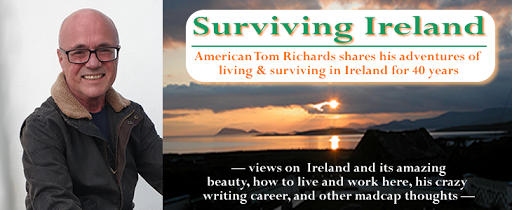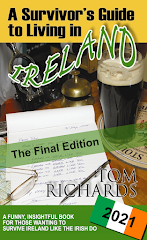Since moving here 34 years ago, this erstwhile Yank has often had to
put up with the varied and often incorrect observations regarding this small
island made by any number of American friends, tourists, acquaintances,
complete strangers, and those who just like to stir the pot. Often the
sometimes caustic remarks about this country are, after brutal examination, wildly
off the mark. Usually I take no heed: after all they don’t live here and even
recalcitrant naiveté is often forgivable.
That said, you wouldn't believe some of the daft, whimsical remarks made by some people. A few include:
"Ireland is part of the United Kingdom. Don't tell me otherwise. I'm sure of it!" (Me: No
Jane. It's an independent Republic and has been for 100 years);
"Ireland is a poor, starving nation unable to help
itself." (Me: No Jack. Ireland currently has the fastest growing economy
in the European Union and is thriving.);
"Ireland's people want to make a nation once again. They want
unity with Northern Ireland." (Me: Well some people do. But a recent poll
conducted in the Republic of Ireland suggests that most Irish citizens reject
this point of view, particularly if the government has to raise taxes to pay
for it.)
This is only some of the silliness I’ve heard. (For a complete
list of What Ireland is Not see my book, A Survivor's Guide to Living in Ireland 2015 edition.) And usually I forgive and
forget. Usually. But not this time. So let me explain.
Quite recently, just yesterday in fact, I posted a CNN article on
Facebook regarding a Republican Party member who is choosing to support
Clinton. A comment quickly came back from a ‘friend’. It read “I thought you
said you were a lifelong Republican. Now, living in one of the most Socialist
countries in the world, you haven’t posted any Republican media.”
While I managed to overlook (almost) the crappy syntax and grammar, when I saw the word 'Socialist' I almost fell off my chair. First and let me
be clear: I post what I consider to be newsworthy articles from any bone fide, reasonably coherent news source which means I’ve also posted Fox articles. Not that it matters.
But
the real Kicker was the ‘Socialist’ comment.
I must say I steamed. I boiled. I
was angry at such a bald-faced piece of silly stupidity born of ignorance. And
I was glad my ‘friend’ had not uttered the comment in my local pub. If they
had, they would have started a gloriously contested argument. At the worst, the
‘friend’ would have been slung out the door, barred from the pub for the rest
of their days, and possibly floated off the island in an empty Guinness barrel.
And why such a reaction? Ireland is not socialist, that’s why. But some crazies continue to believe
this to be true. So let’s do a fact-check to set the record straight, shall we?
Economics 101: Defining Socialism
To dispel this myth let's first start with a very, very simple
definition of Socialism as provided by Webster, to wit: Socialism is “Any of
various economic and political theories advocating collective or governmental
ownership and administration of the means of production and distribution of
goods."
Now let's take Irish economic policy apart, if just a little.
First, Ireland is an open, free-market economy driven by capitalist economic
thinking. This means the country does NOT have excessive regulations on
business or its currency. I've owned a business here since 1987. And while
regulation of any form makes my blood boil, Irish red tape is fairly simple.
This is one of the many reasons why US companies including Google, IBM, Dell
EMC, eBay, Microsoft, and so many others flock here and create opportunity: usually,
government keeps its nose out of their businesses. Other than taxing business (and they do), the Irish government does not attempt to control or coerce private companies.
But what about government ownership of production and
distribution? The Irish government does own, or partially owns, a couple of
business interests including a minority interest in Aer Lingus, the national
airline, which it plans to sell soon. It also owns Irish Rail, our railway
system, but that’s simply because private operators will not incur the high
capital costs necessary to create a railway network. It makes no economic
sense. Ireland’s direct investments are of strategic importance: that is, over
the years Ireland has only owned those products or services it deems important
to national security or to protect its citizenry.
And yes, before someone asks, the government also mostly owns the
roadways in this country. However, that too is changing: recent major highway
construction was carried out as a private/public partnership. In other words,
road investments were made with both government and private company cash.
So, no. Ireland does NOT embrace collective or government ownership
of production and / or distribution. Therefore my ‘friend’s' assertion regarding
Ireland’s Socialist economy is FALSE.
However, reading between the lines, I suspect the comment
regarding Ireland's apparent Socialism was directed more toward its social programs rather than its economics. So let's tear that apart too.
A History of Poverty
To understand Ireland's socially-directed programs you have to
understand at least a bit of its history. As most know, for hundreds of years
Ireland and her people were ruled by Britain. During that period some fairly
dreadful things occurred. Many Irish were transported to the far corners of the
earth against their will. Many perished as a result of famine and disease.
Basic civil rights were denied the Irish: they could not speak their own
language nor practice their own faith. Most could not own land. The Irish were
denied the basic freedoms of assembly, free press, and a living wage. Many died
in abject poverty.
But Ireland declared its independence almost exactly 100 years ago
as I write. It became an independent Free State in 1922, shaking off British rule. Its founding fathers (and mothers) did not forget the impoverished
history of the Irish. Instead, they enshrined a number of policies into the
Irish Constitution. These include equality before the law, the right to life,
personal liberty and freedom of expression, freedom of religion, right to
property ownership, and similar. The constitution does not, however, grant the right to own firearms (for obvious historical reasons). Yes, people here can
own certain weapons. But those do not include hand guns or assault rifles. The
application process for gun ownership is onerous. But it works: for instance, those
who want to own a shotgun or a small calibre rifle for hunting purposes are usually allowed. The nut
cases and criminals are spotted and rejected. And the result? Compared to the US Ireland has an incredibly low
murder rate. Moreover, we have yet to experience a tragedy on par with Sandy
Hook or any other mass shooting. But I digress....
To protect and nurture the Irish people, over the years Ireland
has enacted a number of social policies. As an example: this country has a virtually free
medical system. If a citizen becomes ill they won't go bankrupt due to illness.
In fact: let’s say I get sick today and have to go into hospital. The maximum I’ll
be charged is 750 euro. A year. Consultant and drug fees will be added to
this, but it’s not much. Therefore, I don’t have to worry what will happen to me or my family if I become ill in
Ireland.
Ireland also has a fairly generous welfare payments system if times get hard. If you become
unemployed here, you won't starve. Not usually, anyway. Unemployment assistance is enough to keep
body and soul together. Moreover, we have good financial support for the physically and
mentally disabled who are usually well looked after. In other words, many of
Ireland’s policies reflect the nature of the Irish themselves: the Irish care deeply about people.
Things go wrong of course. As I write, this country is
experiencing a horrific bounce in homelessness due in part to the Great
Recession and its aftermath. Unemployment, though finally falling below 8
percent, is still unacceptably high to most. Some, including many children, still go
hungry at night. And yes, we have our share of deadbeats who will never get a
job and survive by ripping off the system. But no matter. The Irish also
recognize there will always be a few bad spuds
in the potato bag. But that realization doesn't prevent them from helping others. The Irish consider the act of giving a gift. For
instance, their charitable giving is one of the highest in the world on a per capita basis, a wonderful achievement.
It can be construed that Ireland is a social welfare state due to this commitment to socially-caring policies. Perhaps. But if Ireland is
a social welfare state then so too is Great Britain, France, Germany, and most of European Union member states because these countries have adopted similar caring policies.
Don’t get me wrong. There’s a lot wrong in this country, too. For
instance, we all pay through the nose in taxes for the policies and programs that protect
many. We harp about Ireland's 'nanny State' posture, and how the government can trip
over itself in an undesired attempt to protect us from things we believe are nonsense. We constantly belittle the government for
not using its budget (and our taxes) effectively and efficiently.
But I will say this: here, most don’t starve. Here, most have a
fair chance of getting medical help when they need it even when they can't afford it; of going to a good school
and university even if their parents aren’t rich; of not falling through the
cracks into abject poverty. Here the people of Ireland have granted the government a mandate to carry out the caring will of its citizens.
The Irish are truly a giving society. While their economics are
decidedly not Socialist, their care is socially-aware. It is one of the reasons
I so much enjoy living in this country. The Irish truly give a damn about
people.
I've been a fiscal conservative all my life. Every organization -
including businesses and governments - must work within financial budgets or it
can spell disaster. Just look what happened to this country in 2007 when we had
to declare national bankruptcy. I continue to believe that while this country desires to lean over backwards to help people, it must do so in a fiscally responsible manner.
But: my views on
'social welfare' have changed drastically over the years. I have come to firmly
believe that it is a gift to help those who can't help themselves. It is a gift
to do what we can to protect the young and old.
If that is a
definition of 'Socialist' which my Facebook ‘friend’ believes and which he alludes I have embraced, then he's right. I am a Socialist. And as a conservative member of America's Republican Party, I'll gladly wear and defend that label within the context of modern Ireland.
If this blog interests you, then you might want to know more about living and working in Ireland. Are you thinking of traveling to Ireland, moving to Ireland, working in Ireland? Do you want to understand what makes the Irish tick, how you can get a job here, and how to survive in this wonderful country? If so, consider purchasing the 2015 Kindle edition of A Survivor's Guide to Living in Ireland. Over 11,000 have already done so! Now over 85,000 words long, this book could make the perfect gift for those interested in this wonderful country. Simply click on any of the above links to purchase the new 2015 Kindle edition. You can also download free apps to read the Kindle version on any PC or Mac.










